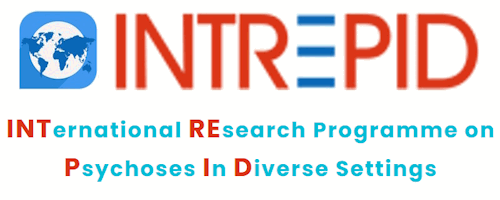Intrepid and Its Work (Site)
INTREPID III: Deepening and Broadening Knowledge of Psychoses Globally
INTREPID III is a 5-year research programme funded by the UKRI Medical Research Council (2023-2028) that investigates the epidemiology of psychotic disorders in several countries in the Global South, including India, Nigeria, and Trinidad.
This work builds upon and expands one of the most comprehensive research programmes ever conducted on psychoses across multiple countries in the Global South.
Previous work
INTREPID III builds on previous work established through INTREPID I and INTREPID II:
INTREPID I: A feasibility and pilot 3-year project to develop and test approaches and methods addressing core methodological challenges in the study of psychoses in diverse settings. (Wellcome Trust funded).
INTREPID II: 5-year project applying approaches and methods from INTREPID I to investigate heterogeneity in psychotic disorders in diverse settings. Identifying, assessing, and 2-year follow-up of people with untreated psychotic disorders (n~ 650 assessed), and relatives, and matched (age/sex) controls. (UKRI MRC funded)
Brief rationale.
Over 80 percent of the world's population lives in the Global South (countries in Latin America, Africa, Asia, and Oceania), but less than 10 percent of research on psychotic disorders is done in these settings. This points to the importance of research in more diverse contexts to both deepen and broaden our understanding of psychotic disorders and to inform the development of locally relevant, humane, accessible, and effective services.
INTREPID III will deliver further novel research programmes in Nigeria, India, and Trinidad through several sub-projects. Throughout the five-year programme, the researchers will investigate the medium-term course and outcomes of psychotic disorders, the possible mechanisms of risk and relapse, and the treatment in marginalised populations. In addition, INTREPID III will establish a global platform for collaborative research on psychoses, sharing research methods and data to develop and test bespoke interventions.
Lived experience will inform and shape this work throughout.
The programme is a collaboration with the Schizophrenia Research Foundation (SCARF) (Chennai, India), the University of Ibadan (Ibadan, Nigeria) and the University of the West Indies (Trinidad), with the London School of Hygiene and Tropical Medicine, and University of Groningen (Netherlands) as additional partners.
Goals
To transform our knowledge of and responses to psychotic disorders globally. This is achieved through:
- delivering novel research programmes on medium-term courses and outcomes, homeless populations, and putative mechanisms of risk and relapse,
- establishing a global study catalogue and data sharing platform, and
- Implementing a structured set of activities in each setting to ensure findings inform the development and, ultimately, the testing of bespoke interventions.
Aims
- To deliver a programme of research that builds on and extends INTREPID II to address cutting-edge questions on medium-term (6-year) course and outcomes of psychoses, marginalised populations (i.e., homeless), and mechanisms underlying onset, course, and outcomes.
- To establish a platform to support collaboration on psychotic disorders and data sharing globally.
- To develop, with individuals with lived experience, carers, and stakeholders, bespoke, locally grounded interventions, drawing on the knowledge base developed from INTREPID II and III.
- To implement a training and development programme to support the sustainability of INTREPID and contribute to research capacity globally.
